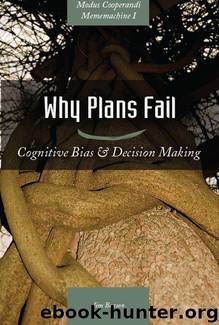Why Plans Fail: Cognitive Bias, Decision Making, and Your Business (Modus Cooperandi Mememachine Series) by Jim Benson

Author:Jim Benson [Benson, Jim]
Language: eng
Format: mobi
Publisher: Modus Cooperandi Press
Published: 2011-12-30T14:00:00+00:00
Learning from Our Mistakes and our Victories: the Availability Heuristic, Negativity Bias and Subjective Well Being
It’s morning at the Starbucks on Seattle’s Lake Union. The blue morning sky and the bright sun are just poking over Capitol Hill. The water and the boats in the foreground while the seaplanes land regularly, buzzing what will soon be the new location of the Museum of History and Industry.
My friend is staring at his coffee cup, rotating it absentmindedly.
“I wanted to talk to you because I’m trying to figure out what to do next.”
He told me his firm had a new, onerous system in place to collect expense reports. Everyone had a budget for various line-items (travel, food, lodging, incidentals) and could not exceed any of them. The CFO was very tight. People were spending more time fixing, then complaining about, their expense forms than the changes were even worth. People were being sent back forms for $5 changes.
After a few minutes, he sighed and said, “It didn’t used to be this way.” He then talked about how he was interviewing with competitors. “Because of the expense report?” I asked. He nodded and said, “It’s all part of our growth into a serious business. I don’t want any part of it. It’s killing our soul.”
I pushed for more information. After all, growth is why most businesses are in business. It would be pretty ironic if growth was actually killing the company. The great corporate culture that built a successful business shouldn’t be a victim of its own success.
It turned out that when this company was young and small, it had almost no restrictions on expenses. There was a community of trust and respect. That trust created an atmosphere of inclusion and excitement. People focused on work and value creation, not supporting forms and policies. For whatever spurious things may have shown up from time to time, most people self-policed fairly well.
As the company grew, those open policies remained until someone took advantage of them with disastrous results. Some extremely incorrect expenses were caught in an audit, embarrassing the CFO and costing the firm extra money in additional auditor attention. Worst of all, it shook the foundations of trust and respect the company was built on.
After a weekend closed-door working session of c-level staff and legal counsel, there was an announcement that the company was now too big to be so open. Changes needed to be made as the company “matured.” In other less diplomatic words, the company was now officially too big to be a fun place to work.
Businesses tend, over time, to collect rules. We collect rules to “save” us from horrible events. When we collect these rules, though, we often over-react. Management has an emotional reaction to both the betrayal that causes the crisis and the annoyance at having to respond to such behavior. They don’t want it to ever happen again.
A primary cause of this type of knee-jerk behavior is something called the Availability Heuristic. The Availability Heuristic says that we are more likely to ascribe a higher probability to events that we actually hold in our memories.
Download
This site does not store any files on its server. We only index and link to content provided by other sites. Please contact the content providers to delete copyright contents if any and email us, we'll remove relevant links or contents immediately.
The Brazilian Economy since the Great Financial Crisis of 20072008 by Philip Arestis Carolina Troncoso Baltar & Daniela Magalhães Prates(133771)
International Integration of the Brazilian Economy by Elias C. Grivoyannis(109605)
The Art of Coaching by Elena Aguilar(53182)
Flexible Working by Dale Gemma;(23285)
How to Stop Living Paycheck to Paycheck by Avery Breyer(19718)
The Acquirer's Multiple: How the Billionaire Contrarians of Deep Value Beat the Market by Tobias Carlisle(12308)
Thinking, Fast and Slow by Kahneman Daniel(12253)
The Radium Girls by Kate Moore(12014)
The Art of Thinking Clearly by Rolf Dobelli(10450)
Hit Refresh by Satya Nadella(9123)
The Compound Effect by Darren Hardy(8941)
Tools of Titans by Timothy Ferriss(8363)
Atomic Habits: Tiny Changes, Remarkable Results by James Clear(8323)
Turbulence by E. J. Noyes(8040)
A Court of Wings and Ruin by Sarah J. Maas(7810)
Change Your Questions, Change Your Life by Marilee Adams(7757)
Nudge - Improving Decisions about Health, Wealth, and Happiness by Thaler Sunstein(7689)
How to Be a Bawse: A Guide to Conquering Life by Lilly Singh(7468)
Win Bigly by Scott Adams(7183)
